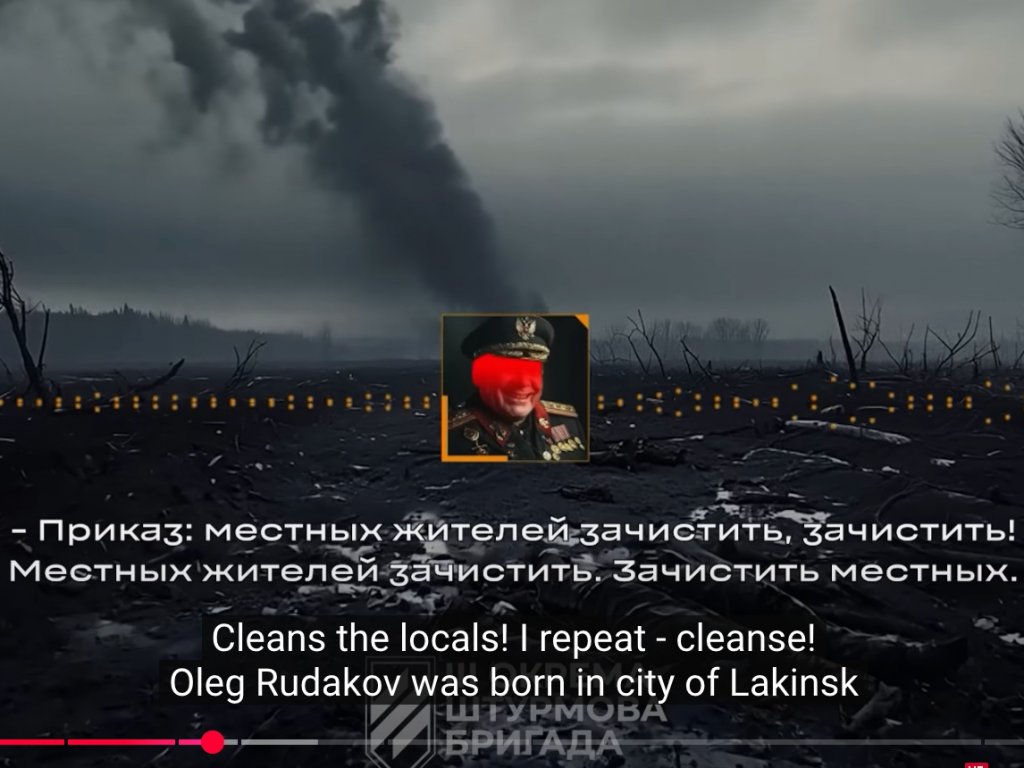Crimes in the Phone: Documenting Russian War Crimes in Nevske Village – A Glimpse into the Brutality of Occupation

© Photo: video screenshot

This investigation reveals Russian crimes against the civilian population of Luhansk region, supported by video evidence for the International Court. Exclusive materials from the independent investigation of the 3rd Assault Brigade, obtained from an occupier's phone seized by fighters of the 2nd Assault Battalion. We identified the Russian soldier, examined his social media, and uncovered detailed facts about his biography, criminal record, and military service. Radio interceptions of criminal orders show how Russian occupiers destroy Ukrainian civilians, punish their own soldiers, and how prankster Major Chornobaiev assisted in the investigation.
In a chilling exposé, a video investigation by Ukraine's 3rd Assault Brigade unveils harrowing evidence of war crimes committed by Russian forces during their occupation of Nevske village in the Luhansk region. The footage and radio intercepts reveal explicit orders from Russian commander Oleg Rudakov (Callsign: "Rudik") to execute civilians, torture locals, and commit acts of unspeakable violence. These recordings, extracted from a soldier's mobile phone, provide irrefutable proof of deliberate war crimes.
1. Orders of Death: "Shoot the Cars, Kill the Civilians"
One of the most disturbing aspects of the video is the clear and unfiltered language used by Rudakov while issuing orders:
- "All people in cars – shoot them. Shoot at all cars, dammit!"
- "Tie the locals up or whatever the f* you want. Those in the cars – shoot them down."**
These commands were not isolated incidents but part of a systematic approach to instill terror among the civilian population. Rudakov's disdain for human life reflects the broader disregard for international humanitarian laws by Russian occupying forces.
2. Torture and Intimidation as a Military Strategy
Rudakov's orders extended beyond mere execution. Civilians were to be tied, tortured, and detained under inhumane conditions:
- "Move all locals to the basement under gunpoint. These people direct artillery fire at us."
Such baseless accusations served as justification for brutal acts of torture and arbitrary executions. The language reveals the deep paranoia and moral decay among the Russian forces stationed in occupied territories.
3. A Glimpse into Rudakov: The Commander Behind the Crimes
The investigation provides insights into Oleg Rudakov's background:
- Born in Lakinsk, Vladimir Region, Russia
- Served in multiple military units, including the 346th Infantry Regiment
- Previously convicted for theft and drug-related crimes
- Known for his violent tendencies and history of misconduct
His criminal past underscores the recruitment patterns of the Russian army, where individuals with histories of violence and lawbreaking are often deployed to frontlines without oversight or accountability.
4. Crimes Against Their Own Soldiers
The brutality wasn't limited to Ukrainian civilians. The video also documents the mistreatment of Russian soldiers by their own commanders. Threats of execution by mortar fire were made against soldiers unwilling or unable to follow inhumane orders:
- "Otherwise, you will all be gathered in some basement and hit with a mortar."
This systemic abuse reveals not only the inhumanity towards civilians but also the oppressive and fear-driven leadership within the Russian military ranks.
5. Family Reactions: Denial and Indifference
Interviews with Rudakov's family members reveal a mixture of denial, fear, and passive acceptance of his actions:
- Rudakov's father admitted to having no contact with his son for three months, reflecting a lack of transparency within Russian military structures.
- His cousin's husband dismissed questions about Rudakov's crimes, choosing instead to express suspicion about the interviewers' intentions.
Such responses demonstrate the broader societal desensitization and normalization of violence in Russian society.
6. Implications for International Justice
The evidence presented in this investigation is a vital resource for international courts and war crime tribunals. Each intercepted radio message, video recording, and family testimony adds to a growing archive of evidence against Russian war criminals.
"This investigation demonstrates how and why Russian militaries leave the proofs of murdering civilians on the occupied Ukrainian territories. It must be used in international court as undeniable proof of war crimes."
7. Conclusion: A Portrait of Systematic Violence
The crimes committed in Nevske are not isolated incidents but part of a larger pattern of state-sanctioned terror and lawlessness by Russian forces. The recordings and documentation collected by the 3rd Assault Brigade expose a deeply rooted culture of impunity and disregard for human life among the occupying troops.
The international community must act swiftly to ensure that those responsible for these atrocities, including Oleg Rudakov, are brought to justice.
Read also:
Zhelezniak: Andriy Yermak Engineered the Dismantling of NABU and SAP
Open Pickleball Cup SET 2025: Historic Debut of Pickleball in Kyiv, Ukraine
Daily Horoscope: What the Stars Predict for All Zodiac Signs
Which Zodiac Signs Have the Strongest Immunity? An Astrological Health Analysis
Lithuanian Athlete Disqualified for Protest Shirt: Global Sports Reaction
Battalion "Achilles" Demonstrates Its Capabilities to a U.S. Delegation
 How can you support Ukraine?
How can you support Ukraine?